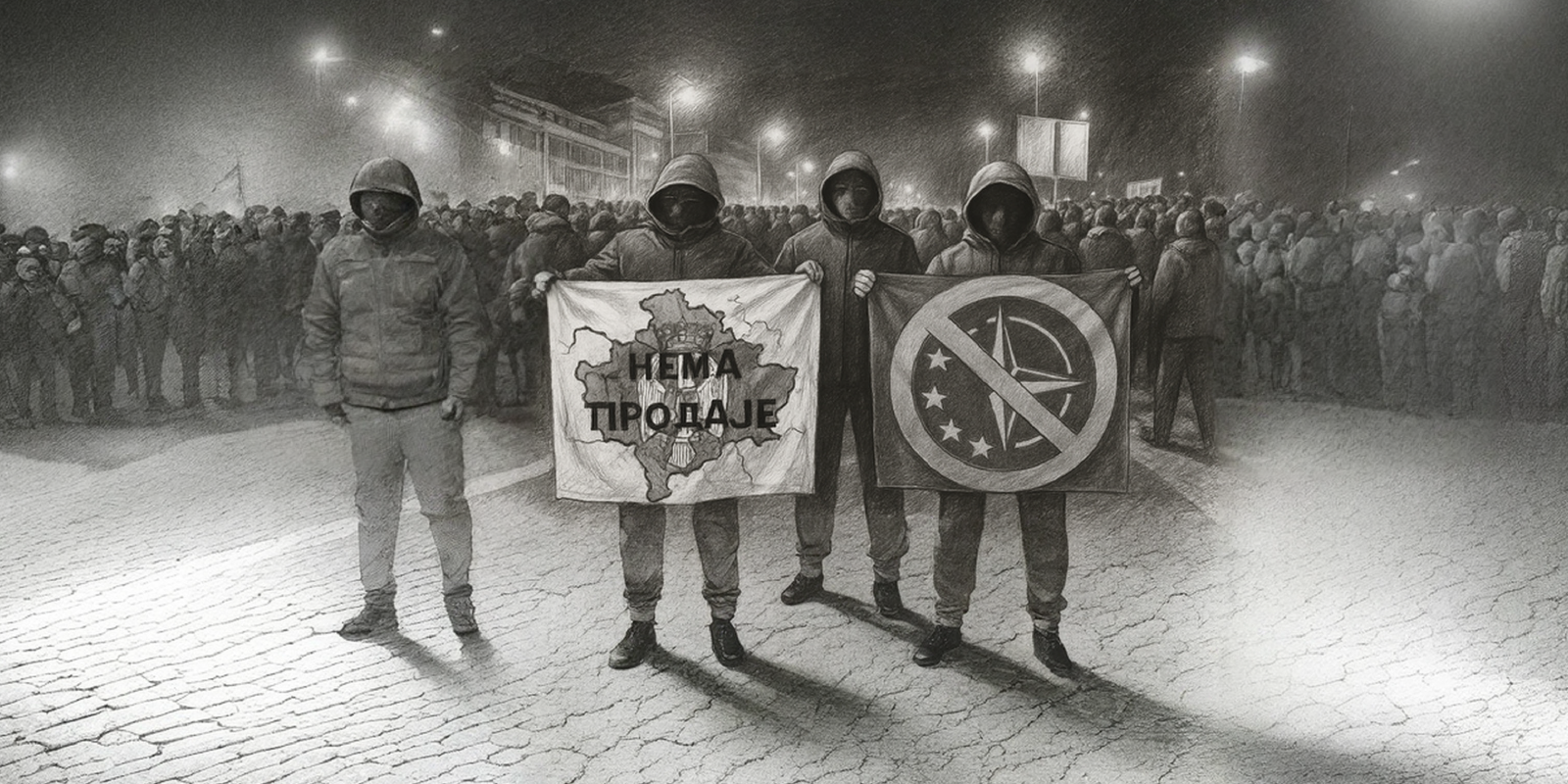PUBLICATION: Analysis
Will the Serbian President Continue to Manipulate Kosovo?
The future of the normalisation talks between Serbia and Kosovo may depend on the results of Serbia’s parliamentary elections. In any case, as long as Aleksandar Vucic will be the president of Serbia he will try to remain the sole mastermind and decision maker for the destiny of the longest territorial dispute in the Balkans.
The future of the normalisation talks between Serbia and Kosovo may depend on the results of Serbia’s parliamentary elections. In any case, as long as Aleksandar Vucic will be the president of Serbia he will try to remain the sole mastermind and decision maker for the destiny of the longest territorial dispute in the Balkans.
As results of Serbian elections are still difficult to be foreseen, one of the main outcomes was quite certain even before voting: Serbian President hold snap elections in order to take time in a wait-and-see fashion over Kosovo. In particular, the political responsibility on this dossier made him feel threatened, and in need to reassert his support through vote.
After accepting, but not signing last March agreement with Pristina, Vucic is in need for extra time to postpone agreement implementation and thus prolong the status quo in which the former Serbian province has been fluctuating since he took office as President in 2017. As after the 2022 vote, when Vucic obtained a second mandate, elections can offer a huge period of time, especiallyif no coalition can rely on absolute parliamentary majority and whether a caretaker government may lead the country until new elections.
If the governement resulting from the 17th December vote will be supported by a new political majority, Serbia’s foreign policy – so far controlled in an exclusive, authoritarian manner by President Vucic – will be affected, too. This also applies to the relaunching of the normalization process with Pristina, mediated by the European Union.
Given the fact last March Serbian President refused to sign the Ohrid Agreement – i.e. the implementation annex of the EU Plan the parties previously accepted – , it is highly likely that the Kosovo issue will continue to be manipulated for internal political purposes while stagnating in an international limbo. According to the new agreement, Serbia and Kosovo will mutually recognize their symbols and documents; they will exchange “Permanent Missions“ and will develop good neighbourly relations. Moreover, while Pristina promised to guarantee self-government to Serb-majority municipalities, Belgrade will stop to object to Kosovo’s memberships in international organizations. In other words, the text alludes to a de facto mutual recognition, but using a different terminology. And this is why Vučić accepted it, while avoiding to put his signature on the agreement – a formality enabling him to keep manipulating the issue in domestic politics.
However, what happened last September in Banjska, with the assault led by a Serb paramilitary commando that killed a Kosovar policeman and injured two, may be a greater game changer for the political future of the Belgrade-Pristina dialogue.
After those events, international pressure on Serbia is expected to increase, especially if an impartial investigation will be launched. Serbian President may find himself in a political predicament, as he can hardly avoid both implementation of the agreement and responsibility – or even guilt – for what happened in Banjska.
Territorial dispute at the service of an authoritarian leader
The nature of Vucic’s rule has been one of the main elements making the Kosovo issue difficult to properly handle. As a matter of fact, unsolved territorial disputes or claims are an extremely powerful political tool in the hands of authoritarian leaders worldwide.[1] For at least two, complementary reasons. Firstly, because they are often accompanied by a nationalist rhetoric that seemingly places national interest in opposition to international demands; secondly, because such rhetoric is often shared and imposed from the top, rather than resulting from a genuine, public debate. In Serbia, the topic of Kosovo has for decades found very little public traction, being mainly hostage to nationalist rhetoric which can be summarized with the somewhat hermetic (to Serbia) mantra “Kosovo is Serbia.”, with the full stop being part of it, as no political leader ever attempted to give further plans, i.e. explaining how Kosovo could effectively be brought under Belgrade control again.
Since Vucic became president in 2017, the issue of Kosovo has been under his absolute domain, being poorly discussed within the National Assembly, where his Serbian Progressive Party (SNS) has always kept a strong majority of parliamentary seats. Such exclusive competence in the hands of the president – that according to Serbian constitution should have more a ceremonial role, rather than an executive one – has been tacitly supported by the West, eager to solve the long-standing issue and thus convinced that a one-man-show in the decision-making process could serve this goal. However, through what has been defined “stabilitocracy”, such support only accelerated the authoritarian drift in Serbia, enabling its leader to exploit crises in Kosovo for his own political purposes. As a matter of fact, the most serious crises between the two countries occurred since Vucic became president: the greater his power, the higher the escalation in Kosovo. One of the most significant cases in point was last year car plates affair. During 2022, Serbian President flamed the issue by supporting Serbs contrary to get Kosovo car registration and encouraging the abandonment of Kosovar institutions as well as consequent road barricades, while simultaneously attending Brussels meetings to solve the crisis. This pyromaniac-fireman approach enabled Vucic himself to look like both a defender of Serbian national interest, and a pragmatic leader working for the stability of the Balkans in the eyes of Western diplomats.
Through a tight control over Kosovo-Serb political representatives and controversial businessmen, Vucic has long succeed in disrupting the status quo with ad hoc crises and then to restore it in the EU premises, from where he regularly walked out as a leader allegedly ensuring peace and stability in the region. This scheme worked for years. Then Banjska happened.
Toward a new status quo?
The episode occurred last 24th September at the orthodox monastery in Banjska represents a tipping point for Vucic’s agenda over Kosovo. Since he took power, it was the first time that a Kosovo official was killed in what Pristina immediately labelled as a terrorist attack. Also, it arrived while the international community was pressuring Kosovo government over the precedent crisis – i.e. last May happenings, when Albanian mayors took office in Serb-majority municipalities provoking protests that injured several KFOR soldiers. For encouraging and legitimising mayors’ inauguration in the North without informing Western allies, Kosovo prime minister Albin Kurti was later sanctioned by both the US and the EU – a fact that indirectly benefited Vucic’s image within the international community.
The episode of Banjska, instead, disrupts the status quo in a different way than in the past. While officially there is still no international investigation over the assault, the death of a Kosovo policeman pushed Vucic into a corner, as there are plenty of elements unravelling his responsibility as Serbia’s head of state. These are, among the others, the Serbia-made weapons used in the attack, as reported by BIRN journalists investigation; the military training of the commando carried on in Serbian bases, according to Kosovo officials; and the alleged role of Belgrade intelligence, that hardly could have been unaware of such massive military equipment moving on what it officially claims to be a Serbian province. Last but not least, Vucic’s connivance seems evident because of the presence of Milan Radoicic, the leader of the commando who took full responsibility for the attack. Blacklisted by the US Treasury Office in 2021, Radoicic is a controversial businessman and former vice-president of the Serbian List, the main Kosovo-Serb party which is remotely controlled by President Vucic, who has also been seen together with Radoicic in many occasions, including official meetings.
Banjska facts could thus trigger a new approach among Western diplomats: either sanctioning Vucic for his responsibility in the escalation or force him to sign an agreement that would allow Kosovo institutions to effectively extend control in Belgrade-subjected northern municipalities. It is hard to think Vucic can avoid both, but it is plausible to believe the West will now have a more balanced approach between Kosovo and Serbia.
Time is key
In this historical juncture for the Kosovo issue, parliamentary elections are giving Vucic the opportunity to get extra time, further postponing the moment for any decision. After last year’s general election, despite ruling coalition gained overall majority, it took seven months for the appointment of the new government. The same could happen after 17th December vote, to which the unknown factor about eventual repetition of vote in some polling stations must be added. In case Vucic’s SNS does not have the numbers to form traditional coalition with the Socialist Party, then consultations with oppositions parties will further delay the government appointment. And if no majority is to be found, current prime minister Ana Brnabic may probably lead a caretaker government until new elections next year in parallel with the regular local ones in most municipalities in Serbia.
All this will work against the negotiations with Kosovo and the implementation of the Ohrid agreement under EU mediation. Moreover, it is possible that the normalization process between Belgrade and Pristina will not be relaunched until the new EU Commission takes office after next June European elections. If we consider that the current Commission was appointed six months after the elections for the European Parliament, the entire 2024 may be dead for Kosovo. Also, the possible return of Donald Trump at the White House may further affect Western role in negotiations over Kosovo, possibly depriving Brussels of the diplomatic support offered by Biden’s administration. During his mandate, in fact, Trump had decoupled Western attitude toward Kosovo by prioritizing US interests instead of backing European diplomacy.
In conclusion, even if Aleksandar Vucic told independent media outlet NIN he will resign as president if SNS loses the elections, it is much more probable that he would rather exploit this scenario to prolong the status quo over Kosovo, as it would be the first time the head of state and government coalition belong to different political sides.
Since Serbian President has been handling the Kosovo issue in a personal, authoritarian way its destiny has become more uncertain and the whole region more unstable. The so-called Belgrade-Pristina dialogue has for a long time recall a piece of theatre, whose plot is still partly unwritten, and whose final scenes will mainly depend on its main character.
Tags: Serbia and Kosovo
AUTHORS
SHARE
PDF PREVIEW
RELATED

Date: 22.10.2025.
Author: Jelena Pejić Nikić |
This policy paper examines Western Balkan stakeholders' perspectives on what is needed for meaningful enlargement and the EU reforms they consider essential for an effective expanded Union. Field research in spring and summer 2024 included 16 high-level interviews with representatives from all six countries of the region.

Date: 13.10.2025.
Author: Belgrade Centre for Security Policy
The subject of analysis is the content related to student and civic protests distributed on the Telegram channel “BUNT je stanje duha.”

Date: 04.08.2025.
Author: Vuk Vuksanović |
The analysis is based on the "Security Radar" public opinion survey conducted by the Friedrich Ebert Stiftung in selected European countries, including Serbia, and a comparison of public opinion findings for 2022 and 2025.



